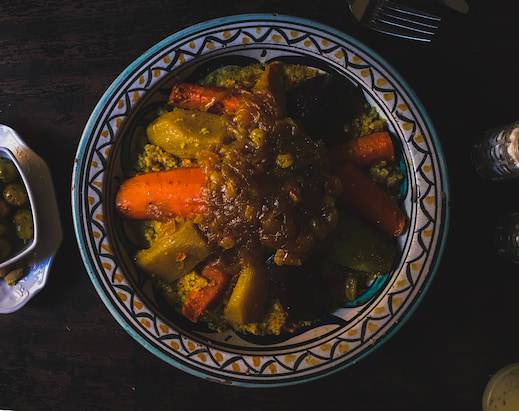

While the Italians have their pasta and the Chinese have their noodles, the Maghrebi people have couscous. Couscous is one of the most iconic meals in North Africa, especially in Morocco, Algeria, and Tunisia.
Put shortly, couscous is one of the most significant meals you can explore if you're interested in the culinary habits of the Mediterranean and the Maghreb region. However, there's no single way to make couscous. Couscous is just an umbrella term that covers all kinds of meals that fall under one category.
Depending on where you are in the Maghreb, the couscous, you might find there might be radically different than another place. For example, some places prepare couscous with fish. I find that strange because where I live, traditional couscous is mainly made from dried meat (jerky). Anyway, more about that later.
Couscous is a sophisticated meal with a complex preparation method and high nutritional value. One could say that couscous contributed a lot to the survival and thriving of the civilizations of North Africa. In Morocco, they refer to couscous as t'aam, which is translated as "food." This shows the cultural significance of a meal.
Nutritionally speaking, couscous combines all the ingredients a human needs to stay healthy: carbs, protein, fibers, minerals, antioxidants, and healthy fat. The way couscous is cooked preserves the nutritional value of all its ingredients.
I should note that there are also Lebanese and Israeli couscous varieties, but I'll focus only on Maghrebi couscous in this article.

Image Credit: Louis Hansel on Unsplash
In Morocco, it's a must to eat couscous with the family after the Friday sermon. Couscous is the number one meal in Morocco, par excellence.
Depending on the occasion, Moroccans serve different types of couscous. The traditional way is called the 7-vegetable couscous, which is the standard post-Friday-Sermon lunch in Morocco. The ingredients include a broth with at least seven vegetables, meat (chicken, beef, or lamb), chickpeas, and a special combination of olive oil, spices, and other ingredients.
The non-standard way of serving couscous in Morocco, often served during gatherings and parties, replaces the vegetables with copious amounts of oven-baked chicken, caramelized raisins, and fried onions.
Once you get a taste of it, one thing for certain about couscous is that no home prepares it like the others. In other words, this is not your McDonald's, which tastes the same everywhere. Isn't that boring?
As a Moroccan, I can recognize who prepared couscous among my aunts merely by looking at the arrangement of the vegetables. Also, each Moroccan region has special quirks in preparing the perfect food..., I mean couscous.

Image Credit: Nasimanilsen25, CC BY-SA 4.0, via Wikimedia Commons
Unfortunately, I've never been to Algeria or any other country on this list. So, I can't go into details about their cuisine. However, since the basic formula of couscous is the same, I can only assume that I'll also like the couscous of my Algerian neighbors with all of its quirks that differ from the ones I got used to.
Actually, Algerians have the same formula as Morocco. The most notable differences come in how the meal is presented. I might be biased, but it comes back to your preferences. I believe the way Moroccan couscous is presented is more visually complex. If you like your meals to look simplistic, you might prefer the Algerian way.

Image Credit: Wajih Khalfallah, CC BY-SA 4.0, via Wikimedia Commons
I personally believe that Tunisian Couscous is crazy; I can't wait to visit Tunisia to taste it. Tunisians didn't just defy all the conventions I got used to by preparing their couscous with very hot sauce; they also specialize in seafood couscous, which is preposterous, as far as mom is concerned.
She can't even conceive of couscous made with octopus or squid. Well, actually, in the Moroccan North, they also cook couscous with seafood, but that's not something all of us know about; it's like a hidden secret.
There is also Libyan and Mauritanian couscous, but that's uncharted territory for me. I hear they prepare their couscous with dates and honey in Libya. I don't think I'm ready for that yet.
Anyway, I hope you enjoyed reading this quasi-informational, ethnocentric piece of literature that embraces bias and subjectivity because it's a matter of taste; I mean literally.
Hafaizi
As someone who has just returned from Morocco, this entire article is somewhat misleading. Couscous is only available on Thursdays in a few select restaurants - good luck trying to find it. You will be hard pressed to find a restaurant selling Tagine food in Tangier (not as much in Rabat-Sale), because they say tajines and couscous are eaten in their homes. Unfortunately, in the restaurants, Moroccans want to eat fast food like tacos, wraps, pizza, burgers, etc. Unless you know some Moroccans who'll invite to eat at their homes you won't be eating any Moroccan food there.